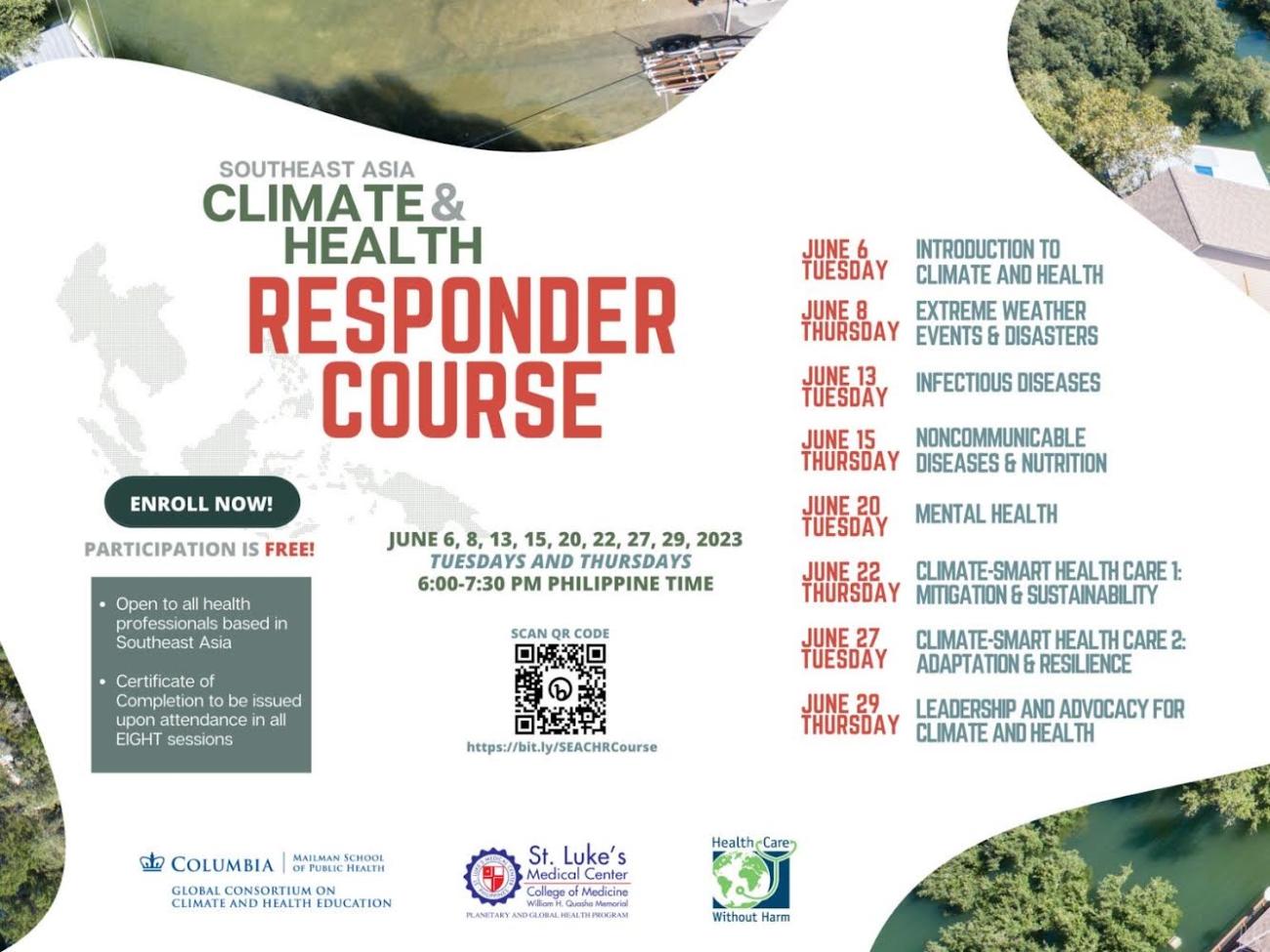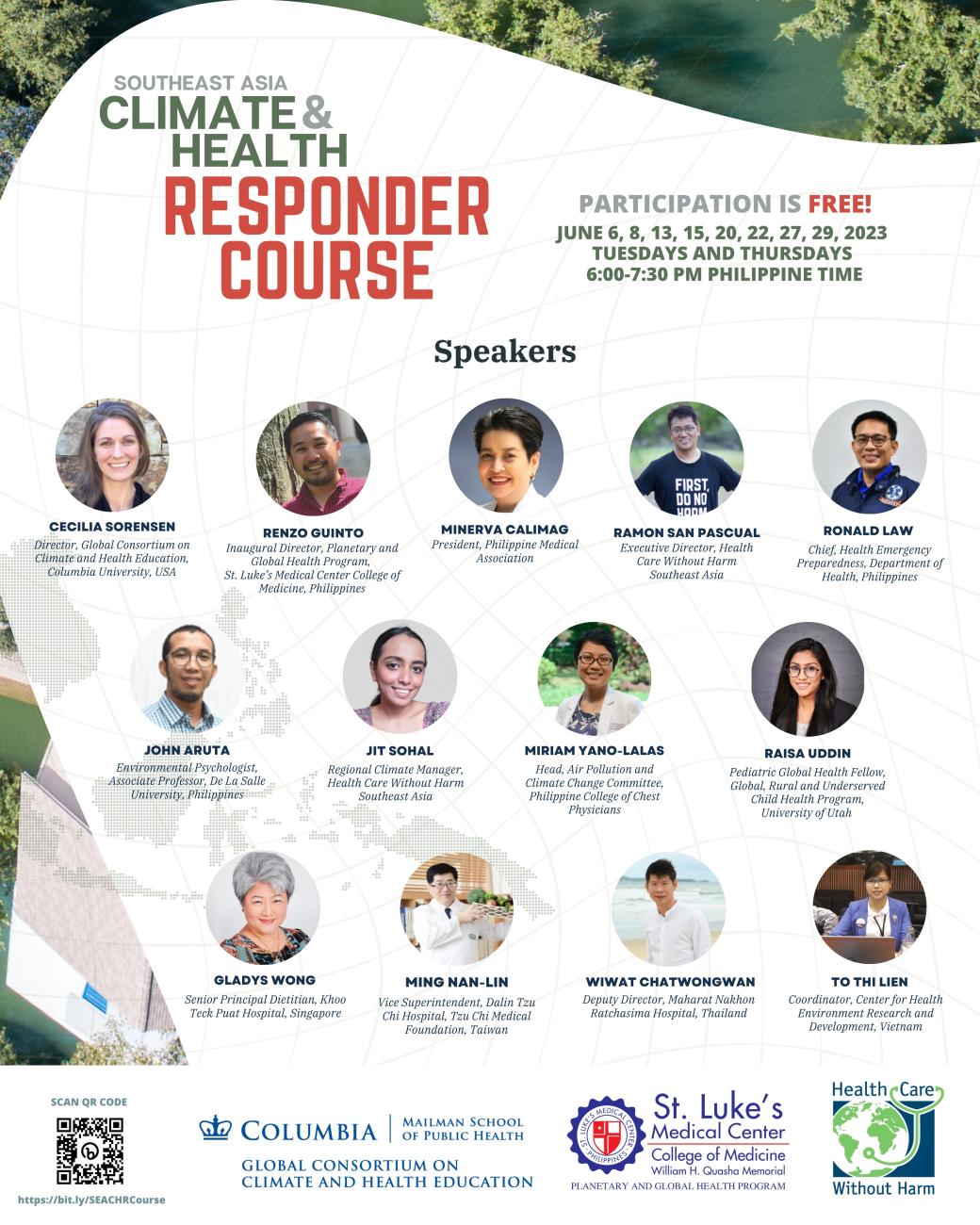Equipping Healthcare Professionals to Combat Climate Change – the Success of the Climate and Health Responders Course
Situated as one of the world's most vulnerable regions to the impacts of climate change, Southeast Asia confronts a dual challenge: adapting to the threats posed by climate change while ensuring development strategies progress towards sustainability goals. This issue is intensified by climate change's impact on existing health concerns in the region, ranging from nutrition and vector-borne diseases to mental health and infrastructure disruptions, further worsening vulnerabilities of communities and health inequities.
To address these pressing challenges, a transformative training course was launched in June 2023 — the Southeast Asia Climate and Health Responders Course. A collaborative effort between the Global Consortium on Climate and Health Education (GCCHE) of the Columbia University Mailman School of Public Health, the Planetary and Global Health Program (PGHP) of St. Luke’s Medical Center College of Medicine-College of Medicine (Philippines), and Health Care Without Harm Southeast Asia (HCWH-SEA), this comprehensive online course aimed to equip healthcare professionals and students, health systems planners, and public health officials and advocates with the necessary knowledge and tools to combat climate change's impact on health and foster regional adaptation strategies.
Throughout the month of June, 8 insightful sessions were delivered to a diverse global audience, drawing over 500 attendees from Southeast Asia and beyond. Renowned experts and practitioners in public health, climate, development, and advocacy shared their expertise, providing invaluable insights for participants.
Session Topics of the Southeast Asia Climate and Health Responder Course
Two of the course speakers were from HCWH-SEA. Our Executive Director, Ramon San Pascual, tackled ‘Climate Smart Health: Mitigation and Sustainability,’ while our Regional Climate Manager, Jit Sohal, discussed ‘Climate Smart Health Care: Adaptation and Resilience.’ Members of our Global Green and Healthy Hospitals (GGHH) network and RISE Southeast Asia Alliance for Climate and Health were also tapped as resource speakers and lecturers for other sessions such as Dr. Ming-nan Lin (Buddhist Dalin Tzu Chi Hospital Taiwan), Dr. Miriam Yano-Lalas (Philippine College of Chest Physicians), Sr. Arcelita Sarnillo (St. Paul’s Hospital in Iloilo), Gladys Wong (Kho Teck Puat Hospital Singapore), and Lien To (Center for Health Environment Research and Development Vietnam), among others.
Resource Persons of the Southeast Asia Climate and Health Responder Course
“Seeing hundreds of attendees joining us from all over the region and beyond in every session fills me with optimism about the healthcare sector's strong regard to addressing climate issues. I hope this goes beyond the screen and translates into local actions. I am proud and grateful for the opportunity to collaborate with esteemed partners like the Global Consortium on Climate and Health Education of the Columbia University Mailman School of Public Health and the Planetary and Global Health Program at St. Luke’s Medical Center College of Medicine-College of Medicine," expressed San Pascual in a statement.
Meanwhile, one of the course participants shared her experience: “It was a great learning experience for me. The sessions were packed with eye-opening lessons on climate and public health issues. On top of this, I felt that the speakers are passionate about what they do, making the course engaging and empowering for the participants."
The Southeast Asia Climate and Health Responders Course has been an empowering journey for the organizers and participants alike. Through expert insights, thought-provoking discussions, and a shared commitment to sustainability, participants have gained invaluable knowledge to champion climate-smart healthcare practices and build resilient communities.
As one of the co-organizers of this initiative, we at HCWH-SEA look forward to witnessing the positive impact of this innovative course in the region – that is, having healthcare professionals pave the way towards a more climate-resilient and sustainable Southeast Asia. For more information on the Southeast Asia Climate and Health Responders, please visit the course page here.
Authored by: Donna Mae Ocmeja, Communications Manager, HCWH SEA

